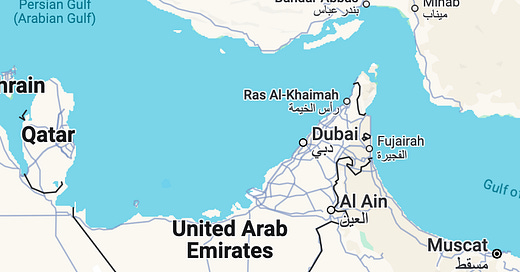It’s Sunday morning: how much do we know? Trump has bombed three sites in Iran, with the main target being the deep underground uranium enrichment facility at Fodow. What do we know? Not much.
Trump has claimed ‘complete obliteration’ of the three targets. Iran, unsurprisingly, disagrees. The B2 bombers involved in the attacks (there are also reports of submarine fired cruise missiles) don’t drop the biggest bomb in America’s arsenal but are the only planes that carry the ‘bunker buster’ ordinance capable of penetrating 60m of reinforced concrete. One site’s centrifuges are buried a lot deeper than that but speculation is focussed on the effects - reach - of multiple bombs. And on where the Iranians have hidden their stocks of enriched uranium.
The financial cost of all this may be trivial, even besides the point, but is worth noting in my view. The B2 bomber (21 appear to be in use) cost between $2bn - $4bn each, depending on which obscure source you look at. Guesstimates for each bunker buster bomb range from $3.5 million to $21 million. Each.
An eyebrow raising claim: the bombers, each with a crew of two, reportedly flew for 37 hours.
Iran’s options are constrained but they do have them. They could do nothing. They could attack single or multiple US bases in the region - there are roughly 40,000 US troops stationed within missile/drone range - most of them much closer to Iran than is Israel. They could close (possibly with mines) the Straits of Hormuz (the narrowest bit of water in the map, above). That would impede/stop the flow of 20 million barrels of oil a day and probably send the oil price north of $100/bl. It would also have the effect of marooning the US carrier group reported to be stationed in the Gulf. Those who have fled ‘Broken Britain’ for Dubai might be rethinking their life choices.
For what it is worth, an account claiming to represent Iran has announced this morning that the Straits are in fact now closed to any oil tankers heading for Europe. Iran’s oil is mostly consumed by Iranians. What they export is sold almost entirely to China (and a bit to Russia).
Oil prices will almost certainly spike next week (even that is uncertain) but the longer term consequences of all this for energy costs this are as clear as mud. If the Iranian regime falls and a new government negotiates the end of sanctions, global oil supply could increase. Expect the unexpected.
If (a big if) Trump backs off and leaves Israel to continue its military campaign, the region will remain unstable, the headlines will be horrific, but it will not portend WW3 as some of the more hysterical commentators are suggesting. Noah Smith gives us an instant assessment along these lines here, suggesting that the long term consequences are likely to be limited. But even he, I think, would admit that this is merely a best guess.
Iran is in a very weak spot. The last time Israel and Iran exchanged missiles, following Israel’s dismantling of Hezbollah and Hamas, an underreported result was the taking out of much of the Iranian air defence complex. Israel’s latest bombardment has done much additional damage to what was left. Syria is no longer Iran’s proxy. But the Houthis are still there, ready to wreak havoc from Yemen. And have said this morning they will resume their attacks, not least on Red Sea shipping.
Any prognostications about economic and financial market outcomes are likely to be wrong. Or correct for a short while only. The difficulty in assessing the effects on markets of major geopolitical events is neatly illustrated by two recent articles in the FT and The Economist. One argues that markets are generally right to be supremely unconcerned, the other suggests markets are far too calm, given all that is happening.
Any investment decisions made over the next few days are likely to be the wrong ones. Do nothing and hope for the best might be a feeble recommendation but it feels like the right one to me.







"What a time to be alive" (anon; 😼)
I'm a little disappointed he didn't say "TACO that Iran"